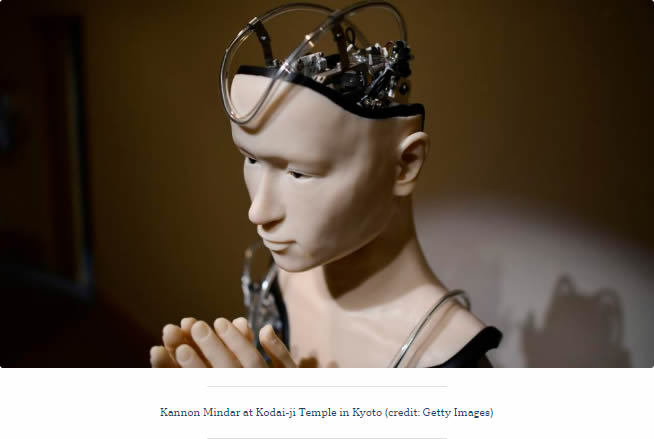先日から「What we can learn about robots from Japan – 日本のロボットから分かること」を読んでいます。

・「日本のロボットから分かること」(1)
Some observers of Japanese society say that the country’s indigenous religion, Shinto, explains its fondness for robots.
識者によれば日本には国家信仰の神道があり、それがロボットを好む所以だという。
indigenous「土着の、原産の、固有で、原産で、先住の」。
Shinto is a form of animism that attributes spirits, or kami, not only to humans but to animals, natural features like mountains, and even quotidien objects like pencils.
神道はアニミズムの一形態で、神性や魂は人だけでなく動物や山等の自然物、鉛筆のような日用品にも宿ると考えられている。
animism「物活論、アニミズム、精霊信仰、精霊説」。
attribute「~に帰する、~の作だとする、属性、特性、特質」。
quotidian「日常の、ありふれた」。
“All things have a bit of soul,” in the words of Bungen Oi, the head priest of a Buddhist temple that held funerals for robotic companion dogs.
「魂は万物に宿っています」とはアイボの葬式も行った寺の住職、大井文彦氏の言葉だ。
According to this view, there is no categorical distinction between humans, animals, and objects,
そうした見解からすると、そこには人や動物、物質の区別は無く、
distinction「区別、差別、特質、特徴、特異性、優秀性、卓越、著名、殊勲」。
so it is not so strange for a robot to demonstrate human-like behaviours
ロボットが人のように振る舞うことも、何ら不思議なことではないだろう、
- it’s just showing its particular kind of kami.
それも万物に宿る神性の一表現であるからだ。
“For Japanese, we can always see a deity inside an object,” says Kohei Ogawa, Mindar’s lead designer.
「日本人にはどんな物にも内部に宿る神が見えるのです」と、マインダーのデザイナー、小川氏は語る。
deity「神位、神格、神性、神、天帝」。
神道の概念については、JHJのライブのMCで思いがけず話が出てきてビックリしました。
その時は彼らの新曲が輪廻をテーマにした作品だったので、仏教や神道にも興味を持っていたんだろうと思いますが、西洋の人たちには、日本人の身近な生き物や生活用品にも何かしら霊性を見るという考え方は、どこか新鮮な概念なのかもしれませんね。
理由は単純明快!「少ないコストでしっかり楽しく学べるから」。
私自身の経験(高機能でビックリ)をびっしり書いていますので、良かったら読んでみてください。
下のバナーからどうぞ!






